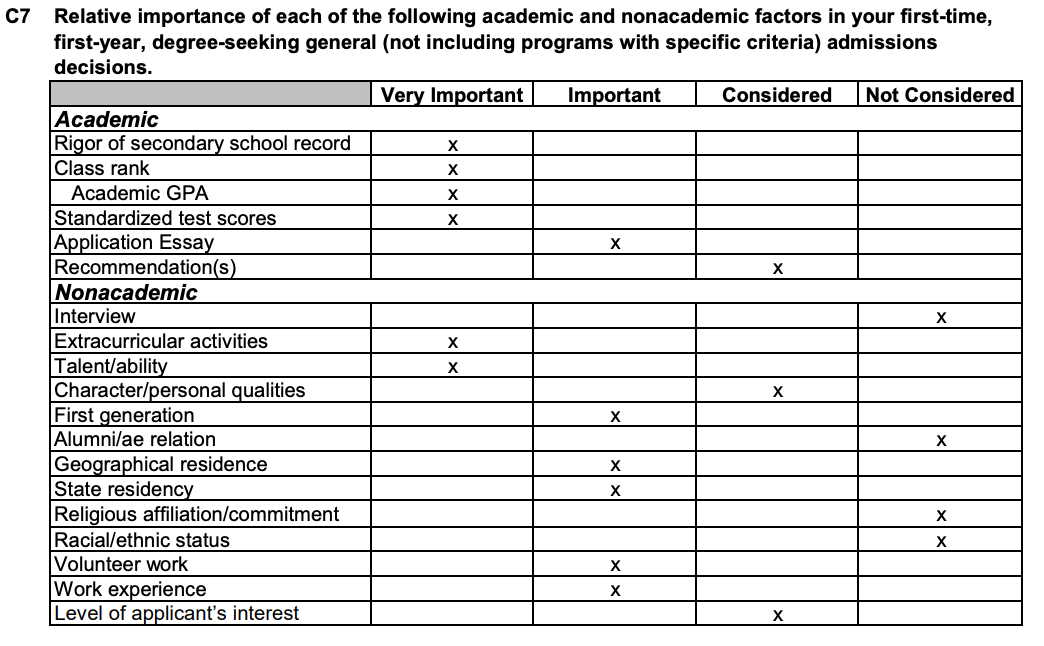
Since the start of the COVID-19 pandemic, the overwhelming majority of colleges in the US have adopted a test-optional policy, meaning that they do not require students to submit ACT or SAT scores with their applications. Fast forward four years and many elite colleges like MIT, Dartmouth, and Georgia Tech are reverting back to requiring standardized test scores.
The questions that many of our college counseling clients ask us are, “Should my child take and submit standardized test scores? Will not submitting scores hurt their chances of admission?” The short answer is that students applying to very competitive schools should absolutely prepare for, take, and submit ACT or SAT scores. Students should only consider not submitting scores when they are significantly below the average for accepted students at their desired college.
Ultimately, standardized testing is still an important part of getting ready to apply to college. For students who have the time and means to do so, preparing for and taking the SAT or ACT is likely to expand their college options and improve their chances of getting into selective institutions.
What are test-optional admissions, and are they here to stay?
A test-optional admissions policy allows students to decide whether or not they’d like to submit their SAT and/or ACT test scores for consideration in the holistic admissions process. Most colleges adopted test-optional policies in 2020 due to health and safety concerns around in-person exams, and many have adhered to these policies ever since. Some universities – most notably the University of California system – took test-optional a step further by adopting test-blind policies, meaning that students who apply do not have the option of submitting a test score even if they want to.
For the time being, test-optional remains the dominant policy in the college admissions landscape; over 1,900 schools will not require an SAT or ACT score for the Fall 2024 application cycle.
Currently, most universities in Texas are test-optional, though some have yet to confirm their policy beyond the 2023-2024 admissions cycle. We’ve included a summary of testing policies for popular Texas colleges below:
| wdt_ID | College | Location | Policy | Link |
|---|---|---|---|---|
| 1 | University of Texas at Austin | Austin | Test Required | Website |
| 2 | Texas A&M University - College Station | College Station | Test optional through Fall 2024 | Website |
| 3 | University of Houston | Houston | Test optional through Fall 2024 | Website |
| 4 | University of Texas at Dallas | Dallas | Test optional through Fall 2024 | Website |
| 5 | Texas Tech University | Lubbock | Test optional through Fall 2025 | Website |
| 6 | Rice University | Houston | Test optional through Fall 2024 | Website |
| 7 | Texas Christian University | Fort Worth | Test optional through Fall 2024 | Website |
| 8 | Southern Methodist University | Dallas | Test optional through Fall 2024 | Website |
| 9 | Baylor University | Waco | Test optional through Fall 2024 | Website |
Which colleges require students to submit a test?
Even with most colleges remaining test-optional, a growing number of notable colleges have reverted to requiring standardized test scores. For students who are interested in applying to these schools, performing the best they can on the SAT or ACT will be an essential part of the process.
We’ve included a summary of several colleges that require ACT or SAT scores from their applicants:
College wdt_ID Location Policy Policy Effective Date Link
Brown University
2
Providence, RI
Test Required
Students entering Fall 2025
Website
Dartmouth College
3
Hanover, NH
Test Required
Students entering Fall 2025
Website
University of Georgia
4
Athens, GA
Test Required
Students entering Fall 2023
Website
Georgetown University
5
Washington, DC
Test Required
Students entering Fall 2023
Website
Georgia Tech
6
Atlanta, GA
Test Required
Students entering Fall 2022
Website
Purdue University
8
West Lafayette, IN
Test Required
Students entering Fall 2024
Website
University of Tennessee
9
Knoxville, TN
Test Required
Students entering Fall 2023
Website
Yale University
10
New Haven, CT
Test Flexible
Students entering Fall 2025
Website
University of Texas at Austin
11
Austin, TX
Test Required
Students entering Fall 2025
Website
Yale University
12
New Haven, CT
2024
Website
Colleges that are test-flexible will accept other forms of test scores, including AP and IB exams. We’d recommend checking the specific policy of the relevant school to make sure your student’s scores will qualify.
Will applying test-optional hurt my student’s admission chances?
Strictly speaking, applying without a test score will not automatically hinder your student’s application or their chances of admission. However, our review of available data suggests that students should seriously consider submitting a test score if they have the time and means to prepare and achieve the best score they can.
Part of that review included analysis of the most recent Common Data Sets published by selective institutions with test-optional policies. The Common Data Set (CDS) is a standardized framework that colleges use to report admissions, enrollment, and financial aid statistics in a uniform and easy-to-access manner. Most colleges publish a new Common Data Set on their website annually, making it more straightforward for prospective students to directly compare the colleges on their list – especially in terms of their admissions chances.
The Common Data Set does not distinguish between acceptance rates among students who submitted test scores and students who did not, and most colleges have declined to publish data to that effect. However, we can draw conclusions from several other data points provided in the CDS – specifically, the percent of enrolled first-year students who submitted SAT scores and ACT scores, and the relative importance assigned by the college to various factors in admissions decisions.
Section C9 of the 2022-2023 Common Data Set for Rice University, for instance, reports that 53% of enrolled freshmen submitted an SAT score, while 23% submitted an ACT score. The CDS only reports these data points separately, meaning that we do not know how much overlap exists due to students submitting both SAT and ACT scores. However, we can conclude that the percentage of enrolled freshmen who submitted scores for one or both exams is somewhere between 53% and 76%. Therefore, students who applied test-optional were in the minority among enrolled students. Even though section C7 of the Rice CDS lists standardized test scores as only “Considered” (as opposed to “Very Important” or “Important”), these numbers make applying test-optional look like a risky proposition.
Below, we’ve compiled similar data points from the 2022-2023 Common Data Sets of a handful of popular, highly selective colleges, including five from the Ivy League:
| wdt_ID | University | Acceptance Rate | % that Submitted ACT Score | % that Submitted SAT Score | Level of Importance According to CDS |
|---|---|---|---|---|---|
| 1 | Rice | 9% | 23% | 53% | Considered |
| 2 | Brown University | 5% | 27% | 54% | Considered |
| 3 | Yale University | 5% | 29% | 59% | Considered |
| 5 | Harvard University | 3% | 28% | 55% | Considered |
| 6 | Princeton University | 5% | 25% | 60% | Very Important |
| 7 | Vanderbilt University | 4% | 32% | 25% | Very Important |
| 8 | Duke University | 5% | 46% | 47% | Very Important |
| 9 | Stanford University | 4% | 23% | 49% | Very Important |
Additional data cited by Jeffrey Selingo in his book Who Gets In and Why further suggests that students may be better off submitting test scores. When Georgia Tech was still test-optional, he reported that its acceptance rate was 22% among students who submitted test scores, and only 10% among students who did not. Similar patterns emerged at Emory (17% with test scores vs. 13% without) and Colgate (25% with test scores vs. 12% without), which both remain test optional.
For most students, we recommend preparing for either the SAT or ACT even for students who are only applying to test-optional schools. Test scores remain an important factor in college admissions, and given that GPA scales vary widely across the country, these exams offer an attractive way for admissions officers to evaluate a student’s academic strengths and directly compare them with other students.
When is applying test-optional a good idea?
Your student should consider applying without a test score if they feel that their SAT or ACT scores are not indicative of their academic capabilities, and/or if their scores are lower than those of the typical enrolled student.
The Common Data Set reports the 25th, 50th, and 75th percentile SAT and ACT scores among enrolled first-year students in section C9. Additionally, the College Board’s Big Future database aggregates similar data in its college profiles; for most colleges, it reports the SAT and ACT scores at the 25th and 75th percentile (in effect, the “middle 50%”) among admitted students.
If your student’s test score is below the 25th percentile at a college they are applying to, they should consider applying test-optional.
Of course, the rest of the application becomes even more important in the absence of test scores, so students applying test optional should ideally have particularly strong grades, extracurriculars, and application essays to support their candidacy.
How can my student stand out when applying test-optional or test-blind?
If applying test-optional, your student will need to ensure that their application showcases their strengths as effectively as possible, especially when it comes to the factors that are most important to each institution they apply to without test scores. Section C7 of the Common Data Set is especially useful here, as it breaks down the importance that each college assigns to various factors in admissions decisions. The 2022-2023 Common Data Set for Texas A&M University, for instance, indicates that their admissions office considers extracurricular activities to be “Very Important” – so, students applying test-optional should take extra care when describing their after-school commitments on their applications.

From Texas A&M, Common Data Set 2022-2023, Section C7
How can my student set a score target and improve their SAT or ACT score?
Taking a baseline mock SAT and/or ACT is a great place to start; General Academic hosts both SAT and ACT practice tests every Saturday. From there, feel free to contact us so we can help plan out your student’s timeline and preparations. Typically, this involves using admissions data for the colleges your student is interested in to help set a realistic goal.
We recommend taking either exam two or three times in total, and your student should aim to wrap up their test prep by the end of their junior year, if possible, so that they can focus on their college applications in the summer before 12th grade.
This article was last updated on April 11, 2024.




